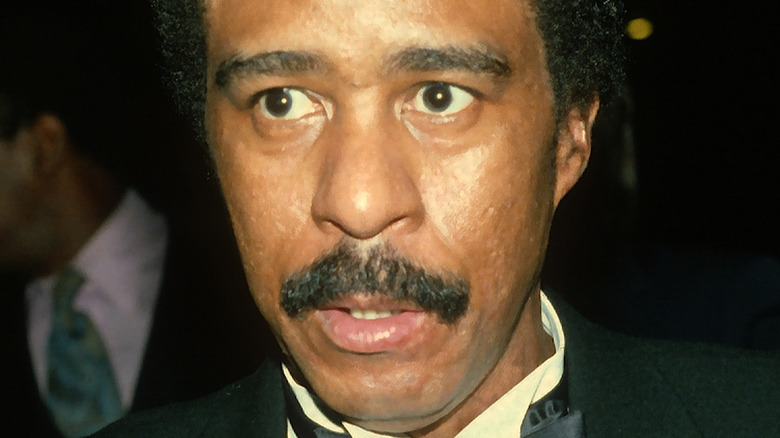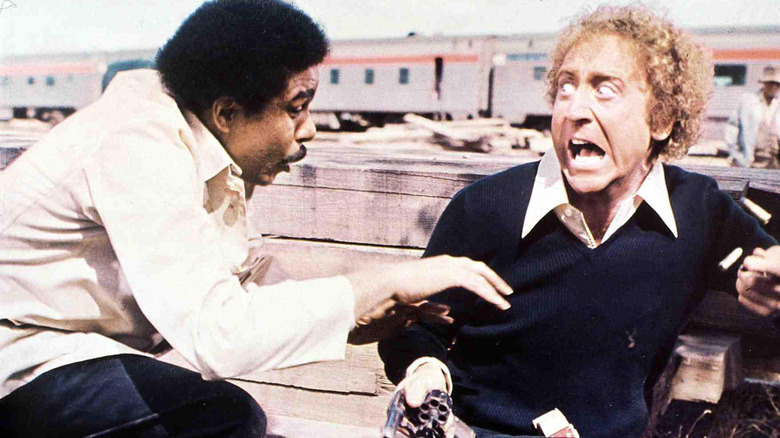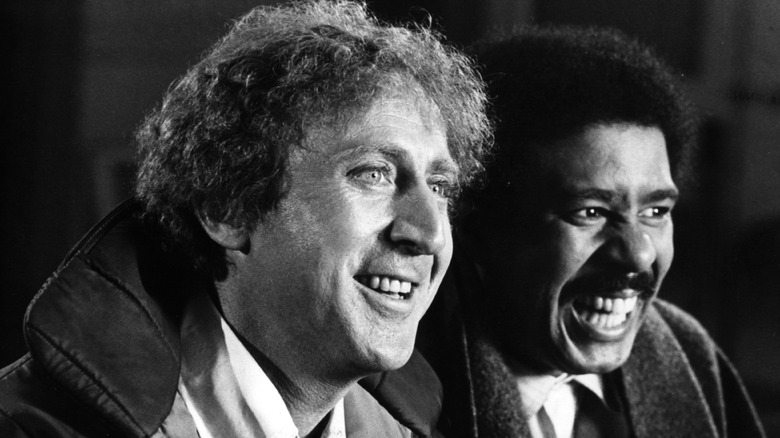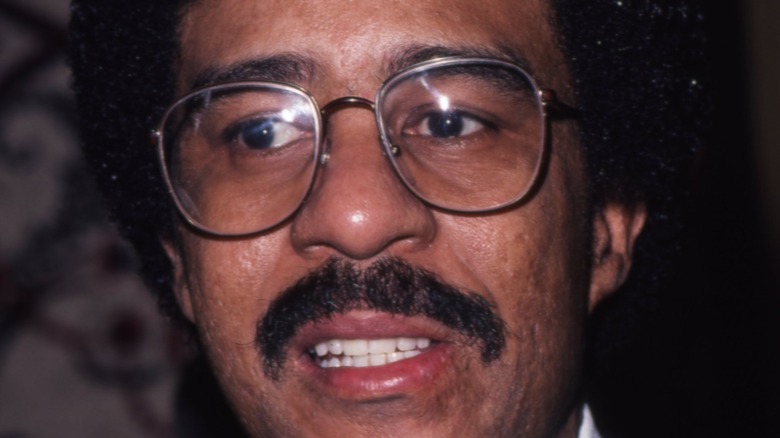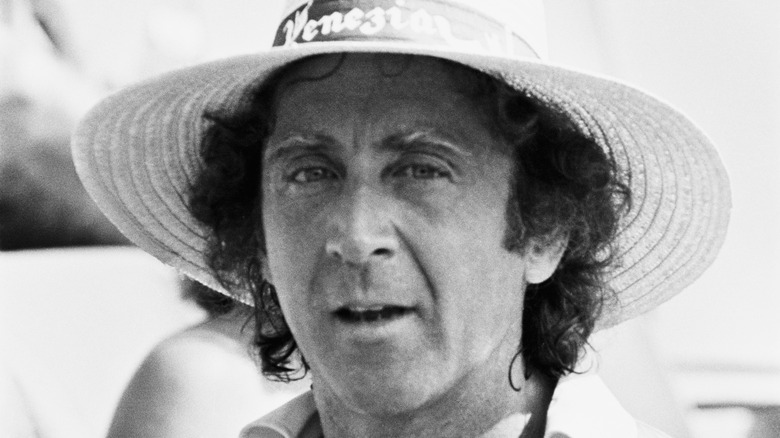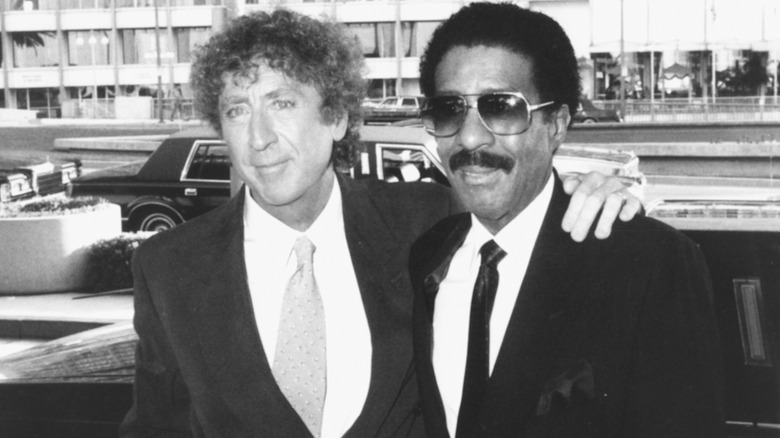Inside The Unique Friendship Of Richard Pryor And Gene Wilder
In the 1970s, actors Richard Pryor and Gene Wilder were enjoying successful careers, but in 1976, when they starred in "Silver Streak" together, their powerful on-screen chemistry helped push them both to Hollywood's highest heights. Like Laurel and Hardy and Dean Martin and Jerry Lewis before them, the comedic duo had a rapport that connected with audiences and resulted in two blockbuster hits before Pryor's personal problems affected the pair's working relationship and box office receipts by the early 1990s.
Richard Pryor, who was born in 1940 in Peoria, Illinois, had a rough childhood and found solace watching movies, according to the Official Estate of Richard Pryor. Before becoming an actor, Pryor worked as a truck driver, meat packer, did a stint in the army, and then found his calling as a stand-up comedian, according to IMDb. Small film roles in the mid-1960s followed until his standout performance in 1972s "Lady Sings the Blues" boosted his Hollywood career. Like Pryor, Wilder — born Jerome Silberman in Milwaukee, Wisconsin, in 1933 — served in the army and held down odd jobs, including as a fencing teacher, before hitting it big in Hollywood (per Biography). Wilder's film career also began in the mid-1960s with small roles, including a part in 1967s "Bonnie and Clyde," before he became a favorite of the writer-director Mel Brooks. Brooks cast him in several of his films, beginning with 1967s "The Producers," which earned Wilder an Academy Award nomination for best supporting actor.
How did Richard Pryor and Gene Wilder Meet?
By 1974, Gene Wilder had become an A-lister thanks to starring roles in "Willy Wonka & the Chocolate Factory" and "Young Frankenstein" when he was cast in another Mel Brooks film, "Blazing Saddles," co-written by Richard Pryor. By this time, Pryor was enjoying success as a writer on shows like "Sanford and Son" and as a standup comedian, earning both an Emmy in 1973 for comedy writing and a Grammy for best comedy album the next year, per Biography. "I knew Richard had been working on the script," Wilder recalled in a 1989 television interview. "But we didn't work together until 'Silver Streak.'"
Following "Blazing Saddles," Wilder got a call from Alan Ladd Jr., the head of 20th Century Fox, about a starring role in "Silver Streak," directed by Arthur Hiller (via NPR). Wilder read the script and loved the part but cautioned Ladd about casting the other starring role. "I said the only one I can think of is Richard Pryor," Wilder told NPR's Terry Gross in 2005. "And he said that's who we're thinking of, and then they offered it to Richard. And he took it, and I met him for the first time in Calgary in Canada, a very quiet modest meeting." The evening before shooting began, the pair met up, hugged, and told each other how much they admired each other's work, Wilder recalled in the 2005 NPR interview. This low-key interaction contrasted wildly with the dynamic energy the pair exhibited on screen starting the very next day.
Their On-screen Chemistry Was Instantaneous
Gene Wilder had never improvised on screen until the shooting of the very first scene of "Silver Streak" featuring him and Richard Pryor. "He said his first line. I said my first line and then this other line comes out of him. I had no idea where it came from. But I didn't question it. I just responded, naturally," Wilder recalled in a 2007 Channel4 interview. "Everything we did together was like that."
Wilder would later compare this on-screen chemistry as being akin to "sexual attraction" in his 2005 memoir "Kiss Me Like Stranger," in the sense that "you don't analyze why you're attracted to someone — it's just chemistry." The film audience also felt the potent comedic energy between the two men. "Silver Streak," a buddy-comedy thriller about a murder on a train, was a hit film that grossed more than $51 million domestically (per The Numbers) and was praised by film critics. The Los Angeles Free Press described the movie as having "the most lovable group of characters ever assembled." The pair then teamed up for 1980's "Stir Crazy," directed by Sidney Poitier (per Britannica).
Onscreen Chemistry Doesn't Carry Over to Real Life
Many a film lover imagines that the relationships actors share on screen naturally carry over into real life, but the truth is often very different. For Richard Pryor and Gene Wilder, when the camera stopped rolling, they went their separate ways. Wilder recalled in his memoir that Pryor "traveled in his own circle" and that the two rarely saw each other when they weren't working. Wilder's reasoning for not seeking out an off-screen friendship with Pryor was a fear that it could ruin their on-screen chemistry, he said in a 1989 television interview. "It's so special what we do when we're together — it's so intimate — I sometimes feel I don't want to take a chance of having anything damaged in private life," he told the interviewer.
But just because they didn't hang out off screen didn't mean Pryor and Wilder held any negative feelings toward each other. Richard Pryor's daughter, Rain Pryor, told The Hollywood Reporter in 2016 that her father thought Wilder was "amazing" and held him in high regard. "That man's a genius, and he's a good man, that's for sure," Richard Pryor told his daughter. Wilder deeply respected Pryor as well, but the comedian's substance abuse affected their relationship.
Richard Pryor's Substance Abuse Strained Their Relationship
During the filming of "Stir Crazy," in which the duo is mistaken for bank robbers and thrown into prison, Richard Pryor's cocaine abuse began to strain his relationship with his co-star. Gene Wilder became incensed by Pryor's continual tardiness during shooting. "At first it was 15 minutes, then half an hour, then an hour, then more. "I was upset at the insult to the cast and the crew and to me," he wrote in "Kiss Me Like a Stranger." During an on-set interview in which Pryor was allegedly under the influence, he made disparaging remarks about Wilder in a profanity-laden rant, according to Biography. The interview never aired, and it was unclear whether Wilder was aware of it.
Even so, their on-screen chemistry didn't suffer. Wilder marveled at how they were totally in sync, believing that "silliness has its own method of communication, and Richard and I were certainly silly together — at least on film," he recalled in his memoir. The result was another massive hit, grossing more than $100 million, per IMDb. But not long after shooting ended, Pryor attempted suicide after a days-long freebase cocaine binge by setting himself on fire, according to Biography. He suffered third-degree burns over more than 50 percent of his body and nearly ruined his career.
If you or anyone you know is struggling with addiction issues, help is available. Visit the Substance Abuse and Mental Health Services Administration website or contact SAMHSA's National Helpline at 1-800-662-HELP (4357).
The Pair Reunited After Nine Years
Richard Pryor's problems also affected Gene Wilder's career. Paramount originally had Pryor and Wilder in mind for "Trading Places," but following Pryor's suicide attempt, the roles went to Eddie Murphy and Dan Aykroyd, according to Insider. The film was hugely successful. It would be nine years before Pryor and Wilder appeared in another film together. By 1989, Pryor had staged a comeback and was sober when they worked together on "See No Evil, Hear No Evil." According to Biography, it was a very different on-set atmosphere, with Pryor behaving professionally throughout filming. "Richard was sane and clear-headed and filled with good humor," Wilder recalled in his memoir. The film grossed $46 million and topped the box office for two weeks, per Biography.
By the time the pair filmed 1991s "Another You," Pryor, who had been diagnosed with multiple sclerosis in 1986, was exhibiting symptoms, and Wilder's wife, Gilda Radner, had died of cancer two years earlier. The comic chemistry the two actors had once shared wasn't as strong as it had been. The movie didn't do well at the box office nor with critics, and it was the last major role for both actors. Pryor died in 2005 and Wilder in 2016, but their on-screen chemistry lives on in a string of classic films. "I think they both helped each other grow as artists in their art form and for who they were outside of their art form," Rain Pryor told The Hollywood Reporter.
If you or anyone you know is having suicidal thoughts, please call the National Suicide Prevention Lifeline by dialing 988 or by calling 1-800-273-TALK (8255).
